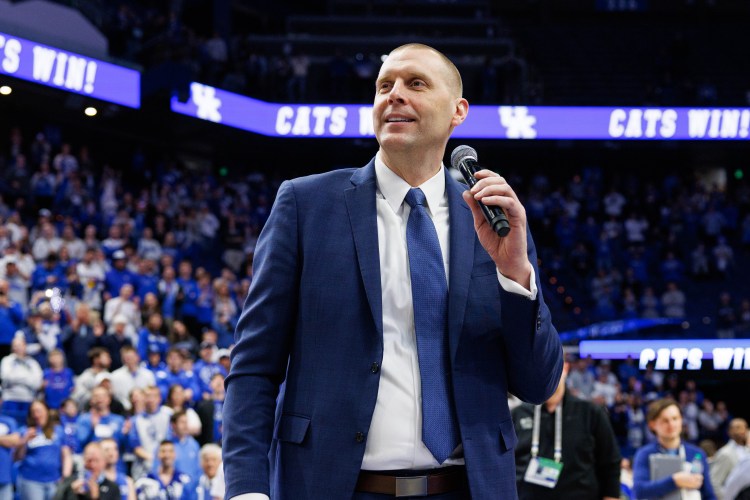The Kentucky Wildcats appear to be in steady hands under head coach Mark Pope, a man whose enthusiasm for the game and for the role of a mentor has become increasingly clear in his public remarks. Pope, who returned to Lexington earlier this year to lead the program he once played for, recently shared his perspective at the prestigious Larry Shyatt Coaching Clinic, delivering a message that both inspired and reflected the realities of today’s college basketball landscape.
“I believe it’s the greatest time to be a college coach,” Pope said, a statement that carried weight not only because of his position at one of the sport’s blue-blood programs but also because of his own journey through the game. “It’s the most challenging, but also the most rewarding. The players need us more than ever before.”
Pope’s comments came in front of a crowd of roughly 200 coaches and basketball professionals at the clinic, which has now been running for 39 seasons. Founded by longtime coach Larry Shyatt, the clinic has grown dramatically over the years — from its humble beginnings of just 10 participants to a major event drawing coaches of all levels from across the country. This year marked its first time being held at UNC Charlotte, and the speaker lineup reflected the caliber of the event, with veteran head coaches, young up-and-comers, and assistants all in attendance.
The Kentucky coach’s words cut to the heart of what makes college basketball unique. Unlike the NBA, where players are established professionals, college coaches are tasked with guiding young men between the ages of 18 and 22. This period of life, as Pope and many of his colleagues have often emphasized, is one of the most formative. Players are developing not only as athletes but also as adults preparing for careers, families, and responsibilities beyond the court.
Former Cincinnati Bearcats head coach Luke Fickell once noted this same dynamic, reminding his peers that coaching at the college level is about far more than X’s and O’s. It is about shaping character, providing structure, and helping athletes navigate both opportunity and adversity. Pope echoed that sentiment in his clinic remarks, positioning himself as a mentor who sees basketball as a vehicle for growth, not just wins and losses.
Of course, Pope’s perspective carries additional significance given his deep ties to Kentucky. As a former Wildcat, he knows firsthand the pressures and expectations that come with wearing the blue and white. He played under legendary coach Rick Pitino, served as team captain, and helped lead Kentucky to a national championship in 1996. That experience, coupled with his coaching journey that took him from BYU to now leading one of the most storied programs in the sport, provides him with a credibility and authenticity that resonates with both players and fans.
His optimism about the current moment in college basketball is particularly noteworthy in an era often described as chaotic. With the transfer portal, name, image, and likeness (NIL) rights, and increased media scrutiny, many have argued that coaching has never been more complicated. Yet Pope embraces these challenges as opportunities. To him, the shifting landscape provides coaches with the chance to be even more impactful in the lives of their players.
That mindset is vital for Kentucky as it looks to re-establish itself at the top of college basketball. The Wildcats’ fan base demands excellence, and the program’s tradition sets a high bar. By emphasizing both the challenges and rewards of modern coaching, Pope demonstrates that he is prepared not just to navigate the evolving environment but to thrive in it.
As the season approaches, Pope’s words serve as both a reflection of his coaching philosophy and a rallying cry for the Wildcats. Kentucky is not just seeking victories on the court — it is looking to build a culture where young men can grow, thrive, and leave prepared for whatever comes next. In Pope’s eyes, that is what makes this moment so exciting. The challenges are real, but the rewards — for players, coaches, and programs alike — have never been greater.
For Kentucky fans, hearing their head coach frame the current era as the “greatest time” to lead young men is not just reassuring; it is a reminder that their program is guided by someone who sees beyond the noise and focuses on the bigger picture. And in college basketball, that perspective may prove to be the Wildcats’ greatest strength.
Related




















